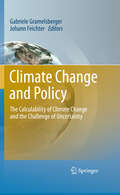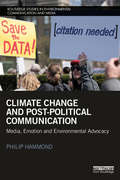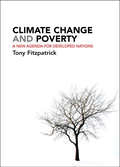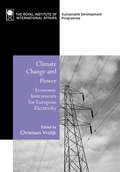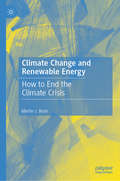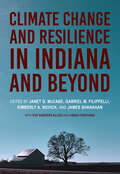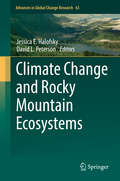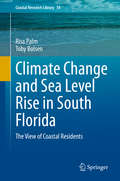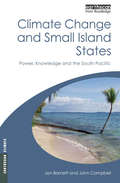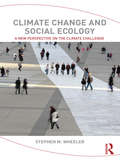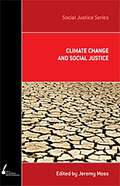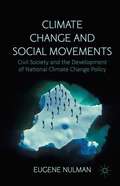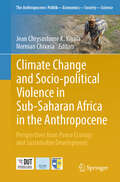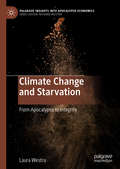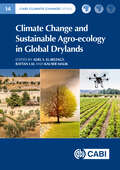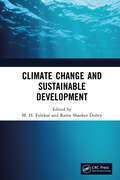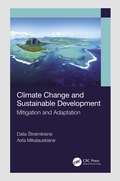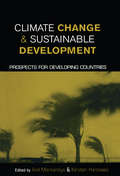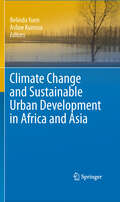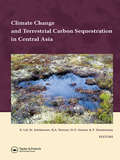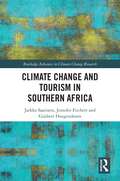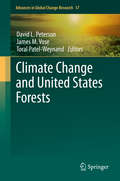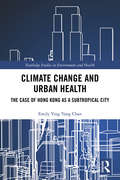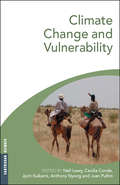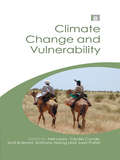- Table View
- List View
Climate Change and Policy: The Calculability of Climate Change and the Challenge of Uncertainty
by Gabriele Gramelsberger Johann FeichterThe debate on how mankind should respond to climate change is diverse, as the appropriate strategy depends on global as well as local circumstances. As scientists are denied the possibility of conducting experiments with the real climate, only climate models can give insights into man-induced climate change, by experimenting with digital climates under varying conditions and by extrapolating past and future states into the future. But the 'nature' of models is a purely representational one. A model is good if it is believed to represent the relevant processes of a natural system well. However, a model and its results, in particular in the case of climate models which interconnect countless hypotheses, is only to some extent testable, although an advanced infrastructure of evaluation strategies has been developed involving strategies of model intercomparison, ensemble prognoses, uncertainty metrics on the system and component levels. The complexity of climate models goes hand in hand with uncertainties, but uncertainty is in conflict with socio-political expectations. However, certain predictions belong to the realm of desires and ideals rather than to applied science. Today's attempt to define and classify uncertainty in terms of likelihood and confidence reflect this awareness of uncertainty as an integral part of human knowledge, in particular on knowledge about possible future developments. The contributions in this book give a first hand insight into scientific strategies in dealing with uncertainty by using simulation models and into social, political and economical requirements in future projections on climate change. Do these strategies and requirements meet each other or fail? The debate on how mankind should respond to climate change is diverse, as the appropriate strategy depends on global as well as local circumstances. As scientists are denied the possibility of conducting experiments with the real climate, only climate models can give insights into man-induced climate change, by experimenting with digital climates under varying conditions and by extrapolating past and future states into the future. But the 'nature' of models is a purely representational one. A model is good if it is believed to represent the relevant processes of a natural system well. However, a model and its results, in particular in the case of climate models which interconnect countless hypotheses, is only to some extent testable, although an advanced infrastructure of evaluation strategies has been developed involving strategies of model intercomparison, ensemble prognoses, uncertainty metrics on the system and component levels. The complexity of climate models goes hand in hand with uncertainties, but uncertainty is in conflict with socio-political expectations. However, certain predictions belong to the realm of desires and ideals rather than to applied science. Today's attempt to define and classify uncertainty in terms of likelihood and confidence reflect this awareness of uncertainty as an integral part of human knowledge, in particular on knowledge about possible future developments. The contributions in this book give a first hand insight into scientific strategies in dealing with uncertainty by using simulation models and into social, political and economical requirements in future projections on climate change. Do these strategies and requirements meet each other or fail? Gabriele Gramelsberger is Principal Investigator of the Collaborative Research Project is Principal Investigator of the Collaborative Research Project
Climate Change and Post-Political Communication: Media, Emotion and Environmental Advocacy (Routledge Studies in Environmental Communication and Media)
by Philip HammondFor many years, the objective of environmental campaigners was to push climate change on to the agenda of political leaders and to encourage media attention to the issue. By the first decade of the twenty-first century, it appeared that their efforts had been spectacularly successful. Yet just at the moment when the campaigners’ goals were being achieved, it seemed that the idea of getting the issue into mainstream discussion had been mistaken all along; that the consensus-building approach produced little or no meaningful action. That is the problem of climate change as a ‘post-political’ issue, which is the subject of this book. Examining how climate change is communicated in politics, news media and celebrity culture, Climate Change and Post-Political Communication explores how the issue has been taken up by elites as potentially offering a sense of purpose or mission in the absence of political visions of the future, and considers the ways in which it provides a focus for much broader anxieties about a loss of modernist political agency and meaning. Drawing on a wide range of literature and case studies, and taking a critical and contextual approach to the analysis of climate change communication, this book will be a valuable resource for students and scholars of environmental studies, communication studies, and media and film studies.
Climate Change and Poverty: A New Agenda for Developed Nations
by Tony FitzpatrickAvailable Open Access under CC-BY-NC licence. Climate change is the main challenge facing developed countries in the 21st century. To what extent does this agenda converge with issues of poverty and social exclusion? Climate change and poverty offers a timely new perspective on the ‘ecosocial’ understanding of the causes and symptoms of, and solutions to, poverty and applies this to recent developments across a number of areas, including fuel poverty, food poverty, housing, transport and air pollution. Unlike any other publication, the book therefore establishes a new agenda for both environmental and social policies which has cross-national relevance. It will appeal to students in social policy, public policy, applied social studies and politics and will also be of interest to those studying international development, economics and geography
Climate Change and Power: Economic Instruments for European Electricity (Energy And Environmental Programme Ser.)
by Christiaan Vrolijk'This book provides an essential guide to the challenges facing the power sector, but is equally enlightening to other industrial emitters, policy-makers and non-governmental organizations.' Charles Nicholson, Group Senior Advisor, BP The electricity industry is one of the main contributors of carbon to the atmosphere. Reducing these emissions is critical to achieving international targets and mitigating climate change. Economic instruments, including emissions trading, taxes and voluntary agreements, will be crucial. However, across Europe there are widely different electricity systems and policies will have different effects. This book describes the characteristics of the main European electricity regimes, defining the range of instruments available and assessing the potential of each in each regime and for Europe as a whole.
Climate Change and Renewable Energy: How to End the Climate Crisis
by Martin J. BushThis book presents a comprehensive overview of the global climate change impacts caused by the continued use of fossil fuels, which results in enormous damage to the global environment, biodiversity, and human health. It argues that the key to a transition to a low carbon future is the rapid and large-scale deployment of renewable energy technologies in power generation, transport and industry, coupled with super energy-efficient building design and construction. However, the author also reveals how major oil companies and petrochemical conglomerates have systematically attempted to manufacture doubt and uncertainty about global warming and climate change, continue to block the commercialization of solar energy and wind power, and impede the electrification of the transport sector. Martin Bush’s solution is a theory-of-change approach to substantially reduce greenhouse-gas emissions by 2050, which sets out realistic steps that people can take now to help make a difference.
Climate Change and Resilience in Indiana and Beyond
by Richard Phillips James Shanahan Geoffrey Brown David M. Konisky Daniel Becker Ellen D. Ketterson Sanya Carley James Robert Farmer Rebecca Lave Keith Clay Paul Staten Eric Sandweiss Elizabeth Grennan Browning Jeffrey S. Dukes Melissa Widhalm Janet G. McCabe Gabriel M. Filippelli Kimberly A. Novick Ben Kravitz Douglas Edmonds Chanh Kieu Travis A. O'Brien Scott Robeson Brian Yanites Chen Zhu Sarah Mincey John Baeten Justin Maxwell Allison Byrd Adam Fudickar Matthew Houser Alex Jahn Jennifer Ann Lau Sarah Wanamaker Heather L. Reynolds Samantha L. Hamlin Dana Habeeb Jeffrey S. Wilson Daniel Myers Beth Edwards Nathan Geiger Andrea Webster Nikolaos Zirogiannis Eva Sanders Allen Lingxi ChenyangClimate change is affecting Indiana's environment, threatening the way Hoosiers live and do business, and introducing new stresses to the state's economy, health, and infrastructure. And while scientists predict more days of extreme weather, increased public health risks, and reduced agricultural production in the coming years, Hoosiers still have a substantial say in determining their future environment. Climate Change and Resilience in Indiana and Beyond confirms that Indiana can rise to meet this threat. The culmination of Indiana University's Prepared for Environmental Change Grand Challenge, this collection showcases how scientists, policymakers, communicators, and others are working hard to protect Indiana's economy and way of life by becoming more resilient. Researchers are creating new environmental resilience frameworks, building on years of existing research on how ecosystems can adapt, how social systems process threats in order to change, and how individuals themselves fit into the larger picture. In addition to presenting research results, Climate Change and Resilience in Indiana and Beyond provides clear examples of how Hoosiers can make a difference by reducing risks, lessening the harmful impacts of climate change, and preparing for the unavoidable.What emerges in these pages is a hopeful, optimistic picture of how resilience is generalizable across systems—from forests to farms to cities—and how Hoosiers are mobilizing this resilience in the face of climate change.
Climate Change and Rocky Mountain Ecosystems (Advances in Global Change Research #63)
by David L. Peterson Jessica E. HalofskyThis book is the result of a team of approximately 100 scientists and resource managers who worked together for two years to understand the effects of climatic variability and change on water resources, fisheries, forest vegetation, non-forest vegetation, wildlife, recreation, cultural resources and ecosystem services. Adaptation options, both strategic and tactical, were developed for each resource area. This information is now being applied in the northern rocky Mountains to ensure long-term sustainability in resource conditions. The volume chapters provide a technical assessment of the effects of climatic variability and change on natural and cultural resources, based on best available science, including new analyses obtained through modeling and synthesis of existing data. Each chapter also contains a summary of adaptation strategies (general) and tactics (on-the-ground actions) that have been developed by science-management teams.
Climate Change and Sea Level Rise in South Florida: The View of Coastal Residents (Coastal Research Library #34)
by Risa Palm Toby BolsenSouth Florida is frequently cited as the part of the United State of America as most susceptible to the devastation accompanying sea level rise. Several scholarly studies have shown the negative impact of coastal location in Florida on housing values. Are the residents of South Florida concerned? Is susceptibility to sea level rise actually affecting the housing market in terms of demand, the availability of home mortgages, or house prices? Are people living at particular risk from sea level rise aware of this risk and more open to new information about climate change? Do they support policies and laws to mitigate the pace and extent of climate change? Answers to these questions are not only of general interest, but they are also key to our understanding of the human dimensions of this problem. This book describes the results of a detailed survey in which respondents viewed a local map displaying flooding to their own community that would result from a Category 3 hurricane in 2033. It discusses political party identification and ideology that has an overwhelming impact in shaping views about sea level rise and climate change. This book has enormous implications for the effectiveness of communicating risk information. The text is important if we, as a nation, are to design communication strategies that will lead to broader policy to combat or mitigate this risk.
Climate Change and Small Island States: Power, Knowledge and the South Pacific
by John Campbell Jon BarnettSmall Island Developing States are often depicted as being among the most vulnerable of all places to the effects of climate change, and they are a cause c?l?bre of many involved in climate science, politics and the media. Yet while small island developing states are much talked about, the production of both scientific knowledge and policies to protect the rights of these nations and their people has been remarkably slow. This book is the first to apply a critical approach to climate change science and policy processes in the South Pacific region. It shows how groups within politically and scientifically powerful countries appropriate the issue of island vulnerability in ways that do not do justice to the lives of island people. It argues that the ways in which islands and their inhabitants are represented in climate science and politics seldom leads to meaningful responses to assist them to adapt to climate change. Throughout, the authors focus on the hitherto largely ignored social impacts of climate change, and demonstrate that adaptation and mitigation policies cannot be effective without understanding the social systems and values of island societies.
Climate Change and Social Ecology: A New Perspective on the Climate Challenge
by Stephen M. WheelerAlthough strategies to prevent global warming – such as by conserving energy, relying on solar and wind power, and reducing motor vehicle use – are well-known, societies have proved unable to implement these measures with the necessary speed. They have also been unwilling to confront underlying issues such as overconsumption, overpopulation, inequity, and dysfunctional political systems. Political and social obstacles have prevented the adoption of improved technologies, which would provide only a partial solution in any case if the fundamental causes of greenhouse gas emissions aren’t addressed. Climate Change and Social Ecology takes a new approach to the climate crisis, portraying global warming as a challenge of rapid social evolution. This book argues that, in order to address this impending catastrophe and bring about more sustainable development, we must focus on improving social ecology – our values, mind-sets, and social organization. Steps to do this include institutional reforms to improve democracy, educational strategies to encourage public understanding of complex issues, and measures to prevent corporations and the wealthy from shaping societies in other directions instead. This book presents a captivating vision of how to help social systems evolve toward sustainability and explores the social transformations needed for dealing with the climate crisis in the long term. It reviews the climate change strategies considered to date, presents a detailed description of a future sustainable society, and analyzes how this vision might be realized through more conscious public nurturing of our social systems. This interdisciplinary volume provides a compelling rethink of the climate crisis. Authoritative and accessible, it will be of great interest to anyone concerned about climate change and sustainability challenges and is essential reading for students, professionals, and general readers alike.
Climate Change and Social Justice
by Jeremy MossThe impacts of climate change can already be felt in society and on the Earth itself. As new evidence of the environmental impact of climate change is constantly emerging, we are forced to confront the significance of our political decisions about who will pay the price of responding to a changing climate. In the rush to avoid or reduce the repercussions of climate change, we need to ensure that the burden is evenly distributed or run the risk of creating injustice. Climate Change and Social Justice demonstrates that the problem of how to distribute the costs of climate change is fundamentally a problem of justice. If we ignore the concerns addressed this book, the additional burdens of climate change will fall on the poor and vulnerable. Jeremy Moss brings together today's key thinkers in climate research, including Peter Singer, Ross Garnaut and David Karoly, to respond to these important issues.
Climate Change and Social Movements: Civil Society and the Development of National Climate Change Policy
by Eugene NulmanClimate Change and Social Movements is a riveting and thorough exploration of three important campaigns to influence climate change policy in the United Kingdom. The author delves deep into the campaigns and illuminates the way policymakers think about and respond to social movements.
Climate Change and Socio-political Violence in Sub-Saharan Africa in the Anthropocene: Perspectives from Peace Ecology and Sustainable Development (The Anthropocene: Politik—Economics—Society—Science #37)
by Jean Chrysostome K. Kiyala Norman ChivasaThis book explores the theoretical contribution of peace ecology to the understanding and practice of environmental and conventional peacebuilding. It integrates environmental questions and factors that drive socio-political violence and climate change-induced violence in Sub-Saharan Africa in the Anthropocene.· It demonstrates how international peace and global security are no longer solely grounded in conventional peacebuilding that has evolved from liberal to democratic peace theories, but rather in the complex, critical and synergic relations between peace studies and environmental studies.· It provides a pluridisciplinary body of knowledge that emphasises the need for food security, social climate, social good, social capital and sustainable development at the age of climate change and climate wars.· It underscores the potential of peace ecology to reduce the Earth systems' vulnerability, to mitigate anthropogenic global warming's consequences on humanity, the ecosystem and biodiversity.· It yields various models of peacebuilding, conflict-sensitive and climate-sensitive adaptation strategies to enhance the African Region’s security and stability.Finally, this volume argues that planetary boundaries framework remains the safer space within which human and sustainable development can be pursued and attained, and future generations to thrive. A comprehensive and international response to socio-political violence and climate-change induced violence should take into account the vulnerability of individual countries, regions and the global world in order to achieve the dreams of a better future; that makes this book a cutting-edge scholarly work.
Climate Change and Starvation: From Apocalypse to Integrity (Palgrave Insights into Apocalypse Economics)
by Laura WestraThere is a lot written on climate change from various points of view, but this is the first work that demonstrates the connection between the hunger of the poor, the deprivation of safe and healthy food on the part of those who can afford it in the wealthy countries, but still face starvation in the sense of lack of nourishment, and climate change itself. It looks at the case law and the jurisdiction of the ICC, and adopts a thorough critical approach. This book is an excellent contribution to the development of the debate on climate change.
Climate Change and Sustainable Agro-ecology in Global Drylands (CABI Climate Change Series #22)
by Rattan Lal Adel S. El-Beltagy Kauser MalikDrylands, a home for nearly 2.5 billion people, are highly vulnerable to anthropogenic climate change, and dryland area may expand to 50% of the Earth's surface by 2100. Climate change may aggravate the prevalence of undernutrition and malnutrition because of adverse effects on quantity and quality of food production in these regions. This book takes a holistic approach to sustainable management of drylands to make agriculture drought-resilient. Eminent scientists from around the world share their knowledge and experiences for adaptation and mitigation of the anthropogenic climate change through innovation in sustainable management of water, soil, crops, livestock, and fisheries. They anticipate that climate change will have major impacts on agro- ecosystems which requires continuous dynamic assessments, globally, regionally, and at the local level where the major action of adaptation would have to occur. The assessment will require international cooperation and national capacity-building. This book emphasizes approaches such as smart and precision agriculture, conservation agriculture, and new innovation and technology as tools for adaptation and mitigation. Several chapters are devoted to the human dimensions and policy considerations with emphasis on enhancing coping and adaptive capacity. This book addresses the picture after COP27, including loss and damage, governance and finance. This book: Examines sustainable management for drylands as a solution to environmental and food security issues. Uses a holistic approach to evaluate sustainable management of drylands. Explains how researchers are translating science into action for greening global drylands. This work will be valuable to students and researchers in agroecology, climate change science and dryland agriculture.
Climate Change and Sustainable Development
by M. H. Fulekar Rama Shanker DubeyClimate Change and Sustainable Development covers the climatic and atmospheric changes, greenhouse gases and their impact on eco-system, biodiversity, water resources, agriculture and food security, human health, extreme weather and environment across two sections. The mitigation and adaptation strategies involving sustainable development is also illustrated including efficient technology, renewable energy, developmental activities control and so forth. Nanotechnology for sustainable development, forest protection, environment, social and economic sustainability and climate change policy planning of international bodies like UNFCC, UNDP, Kyoto protocol is also included. Features: Covers climate change fundamentals and its impact on different ecosystems and natural disasters Describes non-renewable energy aspects like fossil fuel, coal, oil, natural gas and so forth Explores sustainable development in terms of environment, social and economic aspects Includes species diversity and loss, agriculture productivity, water resources scarcity, health and environmental, rise in sea level and coastal area submergence Illustrates scientific hybridization of traditional ecological knowledge for enhancing climate change adaptation This book is aimed at graduate students and researchers in engineering and public policy, engineering management, sustainable engineering, renewable energy engineering, environmental engineering, and sustainability.
Climate Change and Sustainable Development: Mitigation and Adaptation
by Asta Mikalauskiene Dalia ŠtreimikienėClimate Change and Sustainable Development: Mitigation and Adaptation focuses on the link between climate change threats and sustainable development goals. This book analyzes the polices of climate change mitigation and adaptation from an economic point of view by addressing globalization, international trade, and business opportunities and challenges. Based on extended research on energy, transportation, agriculture, and more, the case studies included in this book present business opportunities linked to mitigation and adaptation actions; from European Union greenhouse gas emission trading to climate change adaptation policies in developing countries. It presents a framework for the harmonization of climate and sustainable development policies and their mutual outcomes. Specific features: The first book to address main scientific aspects of climate change mitigation and sustainable development and how to deal with these main challenges in a harmonized way Provides practical examples of policies and business development opportunities linked with climate change mitigation and adaptation Analyses climate change challenges and provides implications for business development and good practice case studies from Europe Discusses issues of climate change at different scales ranging from macro to micro level Highlights the importance of climate change adaptation for developing countries, migration trends, city developments and agriculture As the threat of climate change grows ever more present, resources like this book, that provide and discuss necessary solutions and frameworks for ways to deal with and mitigate that threat become ever more essential. This book is a vital resource for academics, students, and professionals in any field seeking to deal with the threats from climate change, and particularly those relating to environmental and climate sciences, as well as those in political and economic fields.
Climate Change and Sustainable Development: Prospects for Developing Countries
by Anil Markandya Kirsten Halsnaes'Makes a substantial contribution to the practical, effective analysis of climate change mitigation options in developing countries.'Development And Cooperation'The book is an excellent exercise and a good source of detailed information, and a basis for further discussions. Any person interested in this major environmental problem should read it.'International Journal of Environment and Pollution'Markandya and Halsnaes' collection is thoughtfully put together and can be recommended to all the practitioners in the fields of climate change and sustainable development.'The Journal of Energy LiteratureThis text argues that the policies pursued by developing countries will be crucial in determining the progress of climate change. Many are industrializing rapidly and the largest, particularly China and India, could have an impact at least as significant as that of the already industrialized economies - the reason given by President Bush for taking the US out of the Kyoto Protocol. The future of sustainable development in large measure depends on developing countries. This book develops a pragmatic framework for evaluating the climate change options faced by each developing country, depending on their individual circumstances. It assesses present methods, suggests how these might be improved, and proposes ways in which social and developmental aspects can be taken into account. Its discussion of the issues and the methods presented contribute to the practical analysis of climate change mitigation options in developing countries. The book should be useful to professionals, governments, international organizations and environmental groups working on climate change issues; as well as researchers, academics and students in economics, environmental and development studies and international affairs.
Climate Change and Sustainable Urban Development in Africa and Asia
by Belinda Yuen Asfaw KumssaThis book is about African and Asian cities. Illustrated through selected case cities, the book brings together a rich collection of papers by leading scholars and practitioners in Africa and Asia to offer empirical analysis and up-to-date discussions and assessments of the urban challenges and solutions for their cities. A number of key topics concerning housing, sustainable urban development and climate change in Africa and Asia are explored along with how policy interventions and partnerships deliver specific forms of urban development. It is intended for all who are interested in the state of the cities and urban development in Africa and Asia. Africa and Asia present, in many ways, useful lessons in dealing with the burgeoning urban population, and the problems surrounding this influx of people and climate change in the developing word.
Climate Change and Terrestrial Carbon Sequestration in Central Asia
by B. A. Stewart R. Lal M. Suleimenov D. O. Hansen P. DoraiswamyThis book brings together current knowledge of terrestrial C sequestration in Central Asia. The themes treated include: biophysical environments, water resources, sustainable agriculture, soil degradation, the effects of irrigation schemes on secondary salinization, soil management and its relationship to carbon dynamics; the relationship between f
Climate Change and Tourism in Southern Africa (Routledge Advances in Climate Change Research)
by Jarkko Saarinen Jennifer Fitchett Gijsbert HoogendoornThis book explores the nature of climate change in southern Africa, its impacts on tourism and the resilience, adaptation and governance needs in various tourism operations and environments. Previous studies on climate change and tourism have mainly focused on the Global North and specific forms of tourism such as snow-based winter activities. Drawing on case studies from a wide range of countries including South Africa, Lesotho, Namibia, Botswana and Zimbabwe, this book fills this lacuna by describing and analysing the climate change and tourism nexus in the southern African context. The book begins by providing an overview of the current and estimated impacts of climate change to the tourism industry in the region, highlighting the deepening socio-economic inequities, and environmental and social injustices. It focuses on the importance of sustainable tourism in tackling these issues and highlights that resilience and robust governance and policy systems are essential for a tourism destination to successfully adapt to change. By synthesising the key lessons learned through this analysis, Climate Change and Tourism in Southern Africa also draws attention to specific adaptation and policy strategies which have value for other regions in the Global South. This book will be of great interest to students and scholars of climate change, tourism and environmental policy and justice.
Climate Change and United States Forests (Advances in Global Change Research #57)
by Toral Patel-Weynand David L. Peterson James M. VoseThis volume offers a scientific assessment of the effects of climatic variability and change on forest resources in the United States. Derived from a report that provides technical input to the 2013 U. S. Global Change Research Program National Climate Assessment, the book serves as a framework for managing U. S. forest resources in the context of climate change. The authors focus on topics having the greatest potential to alter the structure and function of forest ecosystems, and therefore ecosystem services, by the end of the 21st century. Part I provides an environmental context for assessing the effects of climate change on forest resources, summarizing changes in environmental stressors, followed by state-of-science projections for future climatic conditions relevant to forest ecosystems. Part II offers a wide-ranging assessment of vulnerability of forest ecosystems and ecosystem services to climate change. The authors anticipate that altered disturbance regimes and stressors will have the biggest effects on forest ecosystems, causing long-term changes in forest conditions. Part III outlines responses to climate change, summarizing current status and trends in forest carbon, effects of carbon management, and carbon mitigation strategies. Adaptation strategies and a proposed framework for risk assessment, including case studies, provide a structured approach for projecting and responding to future changes in resource conditions and ecosystem services. Part IV describes how sustainable forest management, which guides activities on most public and private lands in the United States, can provide an overarching structure for mitigating and adapting to climate change.
Climate Change and Urban Health: The Case of Hong Kong as a Subtropical City (Routledge Studies in Environment and Health)
by Emily Ying ChanThis book provides a theoretical framework and related technical skills for investigating climate change and its public health consequences and responses with a focus on urban settings, and in particular Hong Kong, a subtropical metropolis in Asia. Specifically, the book examines the impact of climate change on health in terms of mortality, hospital admissions and help-seeking, as well as key response strategies of adaptation and mitigation. Many existing books tend to consider the relationship of climate change and public health as two connected issues divided into various discrete topics. Conversely, this book explicitly applies public health concepts to study the human impact of climate change, for example, by conceptualising climate change impact and its alleviation, mitigation and adaptation in a public health framework. Overall, this volume summarises what is known about climate change and health and ignites further debates in the area, especially for urban subtropical communities from within a wider global perspective. This book will be of great interest to students and scholars of environmental health, public health, climate change, urban studies and Asian studies.
Climate Change and Vulnerability (Earthscan Climate Ser.)
by Cecilia Conde Jyoti Kulkarni Neil Leary Anthony Nyong Juan Pulhin�Sound and solid case studies on vulnerability and adaptation have been woefully lacking in the international discourse on climate change. This set of books begins to bridge the gap.� Achim Steiner, UN Under-Secretary General and Executive Director of United Nations Environment Programme �Important reading for students and practitioners alike.� Martin Parry, Co-Chair, Working Group II (Impacts, Adaptation and Vulnerability), Intergovernmental Panel on Climate Change (IPCC) �This book fills an important gap in our understanding ... It is policy-relevant and deserves to be widely read.� Richard Klein, Senior Research Fellow, Stockholm Environment Institute (SEI), Sweden The award of the Nobel Peace Prize for 2007 to the IPCC brings needed attention to the threats from climate change for highly vulnerable regions of the developing world. This authoritative volume (along with its companion covering adaptation) resulting from the work of the Assessments of Impacts and Adaptations to Climate Change (AIACC) project launched with the IPCC in 2002, is the first to provide an in-depth investigation of the stakes in developing countries. It discusses who is vulnerable and the nature and causes of their vulnerability for parts of the world that have been poorly researched till now. It also provides researchers with new examples of applications of vulnerability assessment methods, an approach that is of growing interest in the climate change area but for which there are relatively few applications in the literature. Published with TWAS and START
Climate Change and Vulnerability and Adaptation: Two Volume Set (Earthscan Climate Ser.)
by Cecilia Conde Jyoti Kulkarni Neil Leary Anthony Nyong Juan Pulhin'Sound and solid case studies on vulnerability and adaptation have been woefully lacking in the international discourse on climate change. This set of books begins to bridge the gap.' Achim Steiner, UN Under-Secretary General and Executive Director of United Nations Environment Programme 'Important reading for students and practitioners alike.' Martin Parry, Co-Chair, Working Group II (Impacts, Adaptation and Vulnerability), Intergovernmental Panel on Climate Change (IPCC) 'Fills an important gap in our understanding ... It is policy-relevant and deserves to be widely read.' Richard Klein, Senior Research Fellow, Stockholm Environment Institute (SEI), Sweden The Intergovernmental Panel on Climate Change (IPCC) concluded in its 2001 report that much of the developing world is highly vulnerable to adverse impacts from climate change. But the IPCC also concluded that the vulnerabilities of developing countries are too little studied and too poorly understood to enable determination of adaptation strategies that would be effective at reducing risks. These authoritative volumes, resulting from the work of the Assessments of Impacts and Adaptations to Climate Change (AIACC) project launched by the IPCC in 2002, are the first to provide a comprehensive investigation of the issues at stake. Climate Change and Vulnerability discusses who is vulnerable to climate change, the nature of their vulnerability and the causes of their vulnerability for parts of the world that have been poorly researched until now. Climate Change and Adaptation covers current practices for managing climate risks to food security, water resources, livelihoods, human health and infrastructure, needs for effective management of climate risks, the changing nature of the risks, strategies for adaptation, and the need to integrate these strategies into development planning and resource management.
